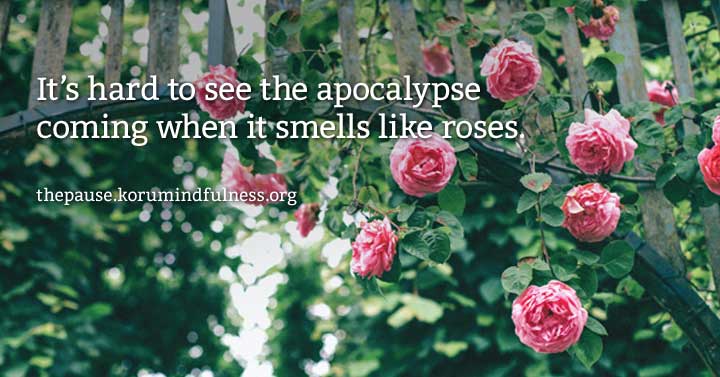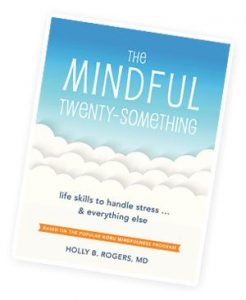
This spring, like each spring for the last few years, a pair of wrens built their nest in my treehouse. Just like in previous years, the female laid five eggs, and five baby birds hatched from the eggs right on time. Both parents diligently tended the baby birds like they always do.
I watch these busy birds closely each year because the nest is in my morning meditation spot. In prior years, I’d see the parent birds rushing back and forth to and from the nest, carrying mouths-full of wriggling bugs to feed their babies.
With the absence of garden bugs, my roses look gorgeous. Without careful attention, I would miss the complex story behind them.
I noticed that this year, the birds seemed to be having a harder time with this chore. Their forays for food seemed to take much longer, and when they returned they would have just a small dot of bug protein in their beaks. My hunch that they were having a hard time finding enough food for their family seemed confirmed when, sadly, only three of the babies survived.
I felt bad for the wrens and I got curious about what was up with the bugs that are their food source. I did a little research and learned, to my dismay, that the bug world is in serious trouble. I learned that scientists have discovered that the bug population has declined in some places by 75% over the last 27 years. There were actually lots of articles like this, many describing the ecological collapse we may face if the bug populations continue to disappear.
This worrisome news got me paying even closer attention to the bugs in my world. I mean, who wouldn’t love fewer mosquito bites, but what about all the other bugs? Bees are in serious trouble which means flowers and veggies pollinated by bees are in trouble. Fireflies are also in decline. There are a few in my yard this year, but not near as many as there were in years past.
I grow a few roses in my garden. I used to spend time battling Japanese Beetles and aphids who love to eat the tender rose buds. This year, those pests are gone. That might seem swell, but the ladybugs and praying mantids who consume the aphids are also missing, and that’s sad.
So now I spend all my time worrying about the bugs, and the birds who eat them, and all the rest of us who unwittingly depend on bugs to keep our ecosystem producing enough food to feed us all.
Edward O. Wilson, a famous bug scientist, has warned:
“If all mankind were to disappear, the world would regenerate back to the rich state of equilibrium that existed ten thousand years ago. If insects were to vanish, the environment would collapse into chaos.”
Edward O. Wilson
Yikes!
This bugs me. But what does it have to do with mindfulness?
With the absence of garden bugs, my roses are gorgeous, with large, pest-free blossoms. Without careful attention, I would miss the complex story behind my beautiful roses.
It’s hard to see the apocalypse coming when it smells like roses.
And that’s how mindfulness links into this whole story.
Mindfulness is about cultivating awareness. It’s about seeing things as they are without judgment or defensiveness. This clear awareness allows you to notice the little details in life that may be easy to miss but are important all the same.
Mindfulness is also about cultivating compassion and caring, for yourself, others and the wider world.
This type of open awareness allows you to notice when harm is being done and then, importantly, feel the desire to intervene.
In your own life, this awareness might allow you to notice that when you don’t get enough exercise, you don’t sleep as well. And when you don’t sleep as well, you feel grumpy and miserable, and it’s hard to get your work done. If you are very aware of this pattern, you will likely want to change it. Because ultimately, none of us want to feel grumpy and miserable.
Similarly, mindful awareness might allow you to notice patterns in your relationships. You might notice that when you speak harshly to your friends, family or coworkers they react negatively. You might notice that their feelings are hurt, or they, in turn, are mean to you, or your relationships suffer in some other way. If you observe this with compassion for yourself and others, you will be more likely to remember to speak more kindly because you won’t like the way it feels when you yell at people.
If your non-judgmental and non-defensive awareness leads you to notice destructive changes in your larger environment, you are likely to be made uncomfortable by it. This may lead you to try to find out how you can help the creatures that are being impacted.
When you practice mindfulness on a regular basis, you are likely to feel more compassion for yourself and others, which might lead you to worry about the bugs, the environment, and all of the other creatures that may suffer if bugs disappear.
Back to the Bugs
I don’t know why the bugs are disappearing. The experts are puzzled as well and seem to think it is some combination of excessive pesticide use, climate change, and chemical runoff into the waterways where most larval bugs begin life.
I certainly don’t have the solution to our disappearing bugs, but I want to do something to help. It is hard to change my behavior, but if I stay truly aware of the consequences of my actions, it is easier to change.
For example, it is tempting to idle the car to keep the AC running while I wait at the bank, but it feels less appealing if I am aware of the fumes emanating unnecessarily from my tailpipe while I’m waiting.
I’m tempted to spray insecticide all over my yard to decrease the mosquitoes, but my worry about the bees, fireflies and other bugs motivates me to find other, less toxic ways to avoid those itchy bites.
I know that complete self-sacrifice in the interest of saving the bugs is unlikely to work; humans just aren’t wired that way. Even the Buddha tried and rejected the path of complete austerity. He ended up advocating the middle path, the mindful way of balance.
What does that middle path look like when it comes to safeguarding our ecosystem and protecting our bugs? Perhaps the best place to start is to learn more about the plight of the bugs and see if it feels important to you. If it feels important, then you are more likely to stay aware of and change your behavior.
Here are a few ideas.
- You can reduce your use of pesticides by making sure you have bug repellant that is safe for you and the environment so that you can enjoy being outside, bite-free, in the summer months.
- Instead of using chemicals, you can set up a fan in your outdoor space, as mosquitoes can’t battle a heavy breeze.
- You can support healthier farming practices by buying organic fruits and vegetables when they are available and affordable for you.
- You can make sure you spend your money at businesses that guard the environment against chemical runoff and water pollution.
All of this takes some work, but if you are mindful and paying attention to the consequences of your choices, I bet you’ll notice that you feel better when you are doing what you can to safeguard our environment.
If you have other ideas about how to take care of our bugs, please share them below !
Get our latest articles in your inbox.

Thanks for sharing about the insects. This is such an important topic! So many animals need insects for their food. My daughter at age 8 began an insect collection and many of her interesting dead specimens were found at the back door, beneath the porch light. Each year there were fewer and fewer insects. Last year, 10 years since she had started collecting, there were almost none. It appears that St Louis has been effective in their spraying program. Or, as you point out, it may be a combination of factors.
I am committed to NOT using glyphosate (Round-Up), and not supporting other companies that support Monsanto. It’s very difficult, because now Bayer owns Monsanto, which means not taking Bayer aspirin or other Bayer products. I know that sounds like a negative solution (saying what I’m NOT doing), but it leaves me feeling a little better. Monsanto produces chemicals that kill bugs on crops, causing their stomachs to explode. Without the pollinators, we’ll all die out, so I want to prevent that. And I do not like bugs! But just because I don’t understand their role better, is not a reason to willy-nilly kill them off. Thank you for this thoughtful, thought-provoking mindfulness article!
Thank you for the reminder, Gigi! We worry about the bugs, bees and birds in our neck of the woods, too.
Be well,
Kathleen
Thanks, Holly, for another mindful message. One way to encourage more bugs to hang out in our gardens is to grow plants native to our region. The insects in any area have established relationships with the particular native plants over the decades. When we plant non-native, even though beautiful, plants, the insects do not stay so the birds don’t have them to feed their babies in the spring.
Thank you! That helps!
This is such an important topic, Holly, and I’m so grateful to you for sharing your wisdom. The relationship between mindfulness and sustainability is drawing more attention these days (check out Chrisine Wamsler’s work: https://theconversation.com/how-mindfulness-can-help-the-shift-towards-a-more-sustainable-society-79127). There is so much – on both individual and collective levels – that needs to be done! In addition to the critical role that mindfulness can play in helping us notice and act on our feelings of compassion for the living world (the insects as well as the roses), mindfulness also helps us work with feelings of helplessness in the face of all the suffering that is happening around us. Through these practices, we can begin to fully embrace the ensuing and inevitable destructive changes to our planet’s ecology while, at the same time, doing whatever we can (like your blog post!) to encourage healthy change. Thanks again for your contribution!
Hey Mike, Thanks for the link to Professor Wamsler’s work. Really interesting to read. And I agree the mindfulness is an aide to connecting with the plight of fellow creatures as well as sustaining our hope and optimism for change. Thanks for sharing.